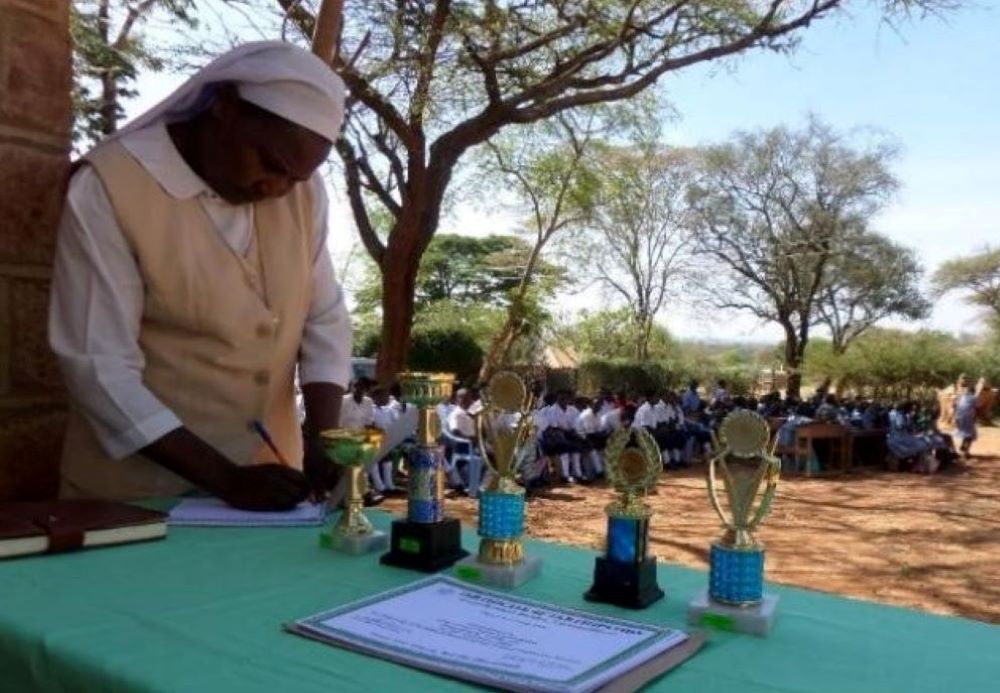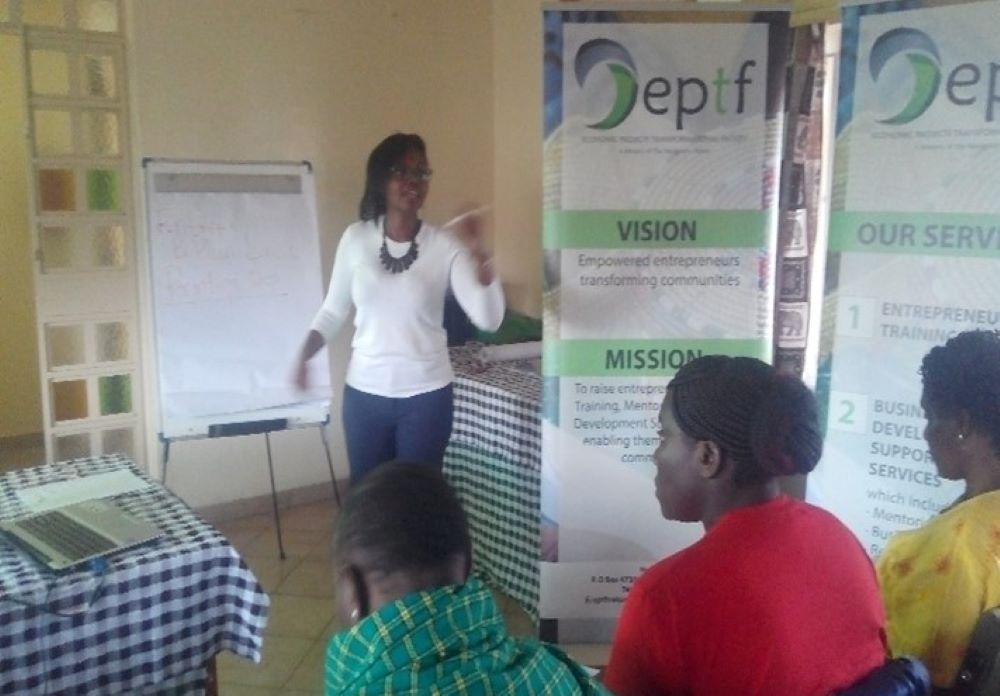
Sr. Josephine Kwenga prepares certificates and trophies to students during an annual commemoration of World Environmental Day in the Machakos Diocese, Kenya. (Courtesy of AOSK)
When I learned that Global Sisters Report has been featuring articles about regenerative agriculture, I wanted to share my experience here in Kenya of a new way of farming that my congregation, the Sisters of St Joseph of Tarbes, is piloting. The method is called permaculture.
Permaculture has three core values: care of the earth, care of people and fair sharing, which encourages farmers to share what they produce. These three values are included in regenerative agriculture, but I understand that regenerative agriculture has a somewhat broader goal, including the management of many aspects of farming: reduced tilling, cover crops, crop rotation, composting, water management and, if possible, animal integration. But its primary focus is soil regeneration, both the improvement of soil that has been degraded and methods to keep current soil healthy. Permaculture also includes these methods.
I began learning about permaculture when I worked at the Association of Sisterhoods of Kenya (AOSK), national office for justice and peace from 2013 to 2020. We provided programs on the environment, gender and human rights, working primarily with women and youth in schools throughout the country. One important project involved a baseline survey of different regions of Kenya to identify needs. Food and economic issues were major concerns, especially in arid and semi-arid lands, or ASALs, which have been experiencing severe drought.
Based on the data we collected, we formed AOSK groups in different dioceses that connected individual projects with similar economic needs and situations. AOSK engaged the Grow Bio-intensive Agriculture Center, or G-Biack, from Kenya and the Economic Projects Transformational Facility to partner with us in the empowerment projects. We provided farming and basic entrepreneurship training with each group, and participants received the specific training they requested.
The farming groups learned to regenerate degraded soil and grow organic food to meet their families' immediate needs. The entrepreneurship group focused on management and finance skills that could help them initiate diverse projects and generate income. As I observed the different trainings, I realized the important value of entrepreneurship skills training as an empowerment tool that could lead to both self-development and sustainability. These skills are useful far beyond any particular project and can be transferred from one kind of project to another.
As I was completing my term of service at AOSK at the end of 2019, COVID struck and people everywhere were struggling to find food and make a livelihood. While still in Nairobi, from 2020 to 2022 I used the knowledge and skills I had learned through AOSK projects to work with women in a slum near my community. I started practicing in a small way the farming skills I had learned, and the women I mentored became successful in sustaining their families' food supplies, which was so very encouraging to them and to me.

An Economic Projects Transformational Facility trainer addresses participants during an entrepreneurship training and social economic forum in Nairobi. (Courtesy of AOSK)
In 2022, I was appointed development coordinator for our province and I moved from Nairobi to our formation house in Nyeri. As I was adjusting to this new ministry, our community's growing need for food security and funds to cover our expenses became very apparent. We were very dependent on support from the province and I could see that this could not last because many other sisters in mission needed funding. Our missionary sisters had for many years helped with finances through connections with external donors. However, as those sisters were becoming fewer, we needed to move to becoming more self-reliant as a province.
As I prayed for inspiration and guidance, I realized that I had skills that could address these issues to some extent; the skills I had learned at AOSK could be transferred here. Our province has land resources around our formation house we could use better and perhaps generate the needed food as well as income.
Now, in my new role and responsible for development programs, I decided to pursue this idea. I shared my dream with the formation community and the provincial government and was encouraged to lead this initiative. In the process I got to know the Laikipia Permaculture Centre (LPC) from G-Biack. LPC centers are located in our area and are experts in sustainable farming methods, but we needed funding to hire them. We were fortunate to get a one-time grant from Caritas Micro project to hire LPC for the training for this project. I then organized the sisters at the formation community and included our daily workers and neighborhood farmers. Our training began in June 2022.
We were taught to be observant — to see how water flows on our land and how to prevent wasting water. We learned about raising vegetables on raised beds to eliminate runoff. We also learned about adding nutrients to our gardens with compost, how to plant trees to provide shelter, how certain plants add needed nutrients to the soil and many other things.
Advertisement
It was exciting to us to see that by using these methodologies even for a short time the crops we planted during our training have all produced well, and provided us with food — especially vegetables — and increased our income. This new income has already subsidized many expenses of our formation community which encourages us to keep going on this path. This was only the beginning for us as a province. I was thrilled when at our province special assembly we decided to engage in farming as a self-sustaining program for the entire province.
But even at the formation house, we had received only basic training. Although what we learned has been very valuable, we also realize that a one-time experience is not adequate. More of our sisters need to be trained so that they can apply the methodologies in their areas and sisters who have had the basic course need mentoring. It is easy to forget the principles when only applying them once. Accompaniment is valuable for sustainable success. We also need more tools and equipment to keep us moving forward to the food security and sustainability goals we hope to accomplish. These new ways of farming take patience. The processes take at least two or more years to become sustainable.
We continue to search for funding so that we can keep growing our skills. At the moment, even though our farming practices have been successful, they only generate enough to cover part of our formation house expenses. Funds for extra training are not yet available. This new journey has opened my eyes in so many ways — to the value of our land, the value of working with others, the value of sustainable farming practices, the fact that we can provide our own food security when we farm well and take care of our land and the environment. More of us need our eyes opened to this new way of life.







